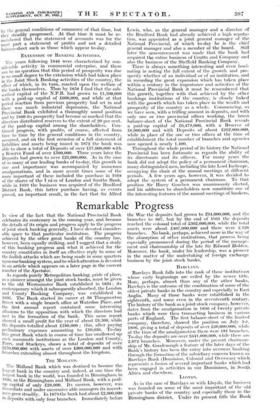EXTENSION OF BANKING ACTIVITIES.
The years following 1846 were characterized by con- siderable activity in commercial enterprise, and there can be no question that this period of prosperity was due in no small degree to the extension which had taken place M the Joint Stock Banking activities of the country, the effect of which, in its turn, reacted upon the welfare of the banks themselves. Thus by 1858 I find that the sub- scribed capital of the N.P.B. had grown to £1,500,000 with a paid-up capital of £600,000; and while at that period reaction from previous prosperity had set in and there was much industrial depression, the National Provincial Bank exhibited a thoroughly sound position and by 1860 its prosperity had become so marked that the directors distributed reserves to the extent of 20 per cent. of the paid-up capital among the shareholders. Con- tinued progress, with profits, of course, affected from time to time by the general conditions in the country, occurred, and on the first occasion of a full statement of liabilities and assets being issued in 1872 the bank was able to show a total of Deposits of over £17,000,000 with a Reserve Fund of over £500,000. Three years later the Deposits had grown-to over £25,000,000. As in the case of so many of our leading banks of to-day, this growth in size and importance was accompanied by numerous amalgamations, and in more recent times some of the more important of these included the purchase in 1918 of the shares of the I ni in of London and Smiths Bank, while in 1919 the business was acquired of the Bradford District Bank, this latter purchase having, as events proved, an important result, in the fact that Sir Alfred Lewis, who, as the general manager and a director of the Bradford Bank had already achieved a high reputa- tion, was appointed as a joint general manager of the National Provincial, of which to-day he is the chief general manager and also a member of the board. Still later the announcement was made that the bank had acquired the entire business of Coutts and Company and also the business of the Sheffield Banking Company. There is always something interesting and even fasci- nating in noting the full extent of the growth and pro- sperity whether of an individual or of an institution, and in recording the great expansion which has taken place within a century in the importance and activities of the National Provincial Bank it must be remembered that this growth, together with that achieved by the other bankings institutions of the country, is closely linked with the growth which has taken place in the wealth and prosperity of the country as a whole. Commencing, as we have seen, with a trifling amount in deposits, and with only one or two provincial offices working, the latest balance-sheet of the National Provincial Bank reveals a paid-up capital of £9,479,000, with a Reserve of £8,000,000 and with Deposits of about £262,000,000, while in place of the one or two offices at the time of establishment the total number of branches and agencies now opened is nearly 1,400.
Throughout the whole period of its history the National Provincial has been fortunate as regards the ability of its directorate and its officers. For many years the bank did not adopt the policy of a permanent chairman, many distinguished men, including the late Lord Inclicape, occupying the chair at the annual meetings at different periods. A few years ago, however, it was decided to adopt the system of a permanent chairman. To that position Sir Harry Goschen was unanimously elected, and his addresses to shareholders now constitute one of the interesting features of the annual meetings of bankers.












































 Previous page
Previous page